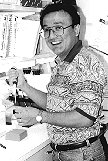
Makoto Migita
As part of a move to be an equal partner in the international biomedical research community, the Japanese government is launching an initiative to support Japanese fellows at NIH and to fund U.S. researchers' visits to Japan.
The Japan Society for the Promotion of Science (JSPS), as part of an arrangement developed with NIH's Fogarty International Center (FIC), announced plans on Feb. 9 to establish a program aimed at promoting Japanese-U.S. scientific exchange. The new program follows a pilot program, instituted last winter, that is currently supporting 30 Japanese fellows in their final year of training at NIH and 25 U.S. scientists, including eight NIH researchers, on short-term visits to Japanese labs. Under the new program, Japanese fellows at NIH will receive funding from JSPS for up to two years. JSPS, which is a branch of Japan's Ministry of Education, Science, Sports, and Culture, expects to award 30 of the competitive fellowships in 1996 and another 30 in 1997.
"The primary incentive to apply for this funding is that the institute, center, or division may not otherwise be able to accommodate such a postdoctoral experience. Plus, there's the prestige and the slightly higher stipend [than a regular visiting fellow]," says Associate Director for Intramural Affairs Philip Chen.
Makoto Migita |
Michael Snyder, FIC's program officer for Japan and China, says, "I think that the highest levels of the Japanese government have developed an appreciation for having a world-class basic research structure, especially a life-sciences component - and have realized that in order to do that, they need to be able to attract U.S. researchers to Japan and to support Japanese researchers around the world."
In addition to the Japanese fellows program, JSPS will continue to fund a "limited number" of fellowships for U.S. researchers in the biomedical and behavioral sciences who want to pursue collaborative research at Japanese universities and scientific institutions. Migita is also enthusiastic about that part of the program, saying he hopes the exchange will broaden the scientific horizons of young Japanese researchers and make them more open to international collaborations.
Among the U.S. scientists going to Japan this year courtesy of JSPS is Susan Garges of NCI's Laboratory of Molecular Biology, who is spending a couple of weeks in the lab of a world-renowned expert on RNA polymerases, Akira Ishihama, at the National Institute of Genetics in Mishima. Garges wants to learn how to purify mutant RNA polymerases for her studies of transcription in Escherichia coli. "I had known that I'd probably have to go to Japan to do this work," she says, "When the JSPS announcement came along, it seemed like an ideal opportunity."
NIA's Edward Spangler also decided to get a taste of scientific life in Japan. He will work for four months with Hideki Kametani, a former colleague in NIA's Laboratory of Cellular and Molecular Biology, learning an innovative microdialysis procedure for the in vivo assessment of dopamine release in the brains of aging animals. Kametani's lab is at Fukuoka Prefectoral University on the southern Japanese island of Kyushu. Like Garges, Spangler doesn't know any Japanese, but in preparation for his trip, he picked up a few "survival words" from some Japanese postdocs at NIA.
Also heading off to the island of Kyushu is NCI's Angela Manns, whose epidemiological research centers on a retrovirus endemic to the Caribbean and Japan, human T cell lymphotropic virus-type 1 (HTLV-1). During her three-week stint with Shunro Sonoda, a Kagoshima University researcher with whom she has collaborated for several years, Manns hopes to gain some new insights into how immunogenetics influences the type of disease seen in HTLV-1 patients. She will also spend one week at the National Institute of Genetics' DNA research center.
The deadline for the next round of JSPS fellowships has not been set, but it is likely to be in late fall. For more information, contact FIC's Division of International Relations (phone: 496-4784, fax; 480-3414; e-mail: snyderm@nih.gov).
Catalyst Mailing ListTo be added to or deleted from the Catalyst mailing list, or to change your mailing address, contact our editorial offices (phone: 402-1449; fax: 402-4303; e-mail: catalyst@od1em1.od.nih.gov). |